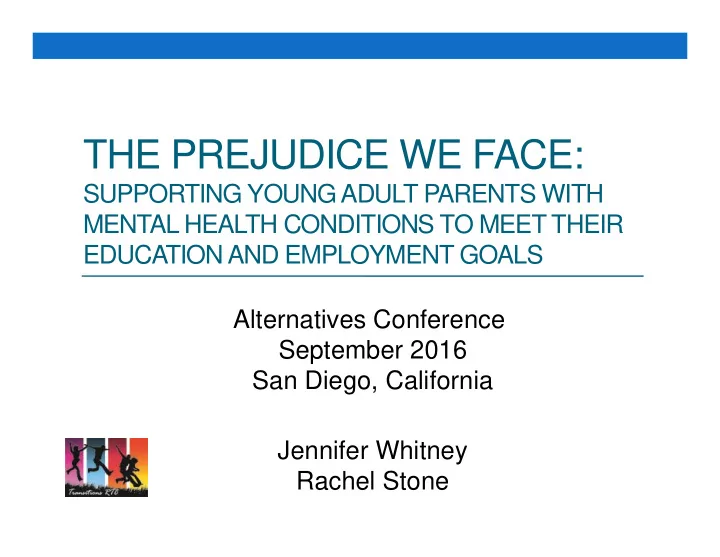

THE PREJUDICE WE FACE: SUPPORTING YOUNG ADULT PARENTS WITH MENTAL HEALTH CONDITIONS TO MEET THEIR EDUCATION AND EMPLOYMENT GOALS Alternatives Conference September 2016 San Diego, California Jennifer Whitney Rachel Stone
Acknowledgements The Transitions RTC aims to improve the supports for youth and young adults, ages 14 ‐ 30, with serious mental health conditions who are trying to successfully complete their schooling and training and move into rewarding work lives. We are located at the University of Massachusetts Medical School, Worcester, MA, Department of Psychiatry, Systems & Psychosocial Advances Research Center. Visit us at: http://www.umassmed.edu/TransitionsRTC The contents of this presentation were developed under a grant with funding from the National Institute on Disability, Independent Living, and Rehabilitation Research, and from the Center for Mental Health Services of the Substance Abuse and Mental Health Services Administration, United States Department of Health and Human Services (ACL GRANT # 90RT5031, The Learning and Working Transitions RRTC). NIDILRR is a Center within the Administration for Community Living (ACL), Department of Health and Human Services (HHS). Additional funding provided by UMass Medical School’s Commonwealth Medicine division. The contents of this presentation do not necessarily represent the policy of NIDILRR, ACL, HHS, SAMHSA, and you should not assume endorsement by the Federal Government.
Emily, age 4 ½ Jennifer’s Story
Why is this important? Among those with any psychiatric disability 68% are mothers 57% are fathers
Average Age of Birth of First Child General Population Lifetime Prevalence of Psychiatric Disorder Women: Women: Ages 24-26 Ages 19-21 Men: Men: Ages 27-28 Ages 24-25
To Reiterate… • This is a vulnerable population • 2/3 of parents under age 25 are single parents, mostly outside of marriage o Twice as likely as older parents to be leading a single-parent household • Young parents tend to come from a lower socioeconomic background, have finished fewer years of school, and are more likely to receive public assistance o Holds true across race and ethnicity
How Are Mental Health Authorities Addressing the Needs of Client Who Are Parents? 1990 1999 Identify as parents 31% 24% Assessment parenting 45% 22% skills/functioning Programs for parents 55% 29% Hospital policies for parents 0% 4%
Career Development Activities in Young Adulthood Among Individuals with SMHC • Employment is critical for young adults living with SMHCs as they work towards recovery because it provides: • Structure • Daily activity • Meaning • Social contact • Community integration • Self-esteem • Income • A better quality of life
Education Activities in Young Adulthood Among Individuals with SMHC • Education is also critical for young adults living with SMHCs as they work towards recovery • Developmental milestone • Enhance financial security • Increase earning potential • Vocational success and opportunity • Structure • Daily activity • Meaning • Social contact & Community integration • Self-esteem
Some Simple Truths • People with mental illness are parents & • Parenting is a key life domain & • Young people are often focused on employment and education
Resources http://www.voices4hope.net/parenting.html
Resources, continued
Sources • Biebel et al, 2015 • Driscoll et al., 1999 • Lichter et al., 2003 • Martin et al., 2013 • Mincieli et al., 2007 • Nicholson, 2014 • NCS Data • Osgood et al. • Smock and Greenland, 2010
THANK YOU! If you want more information, please contact: Jennifer Whitney Jennifer.Whitney@umassmed.edu Rachel Stone Rachel.Stone@umassmed.edu Transitions RTC 222 Maple Avenue Shrewsbury, Massachusetts 01545
Recommend
More recommend